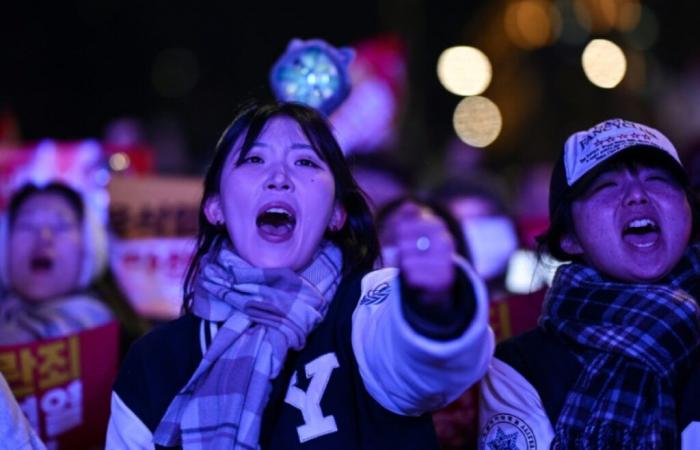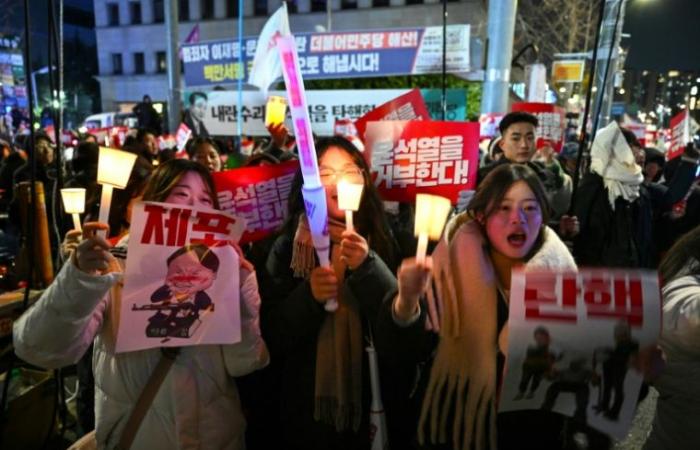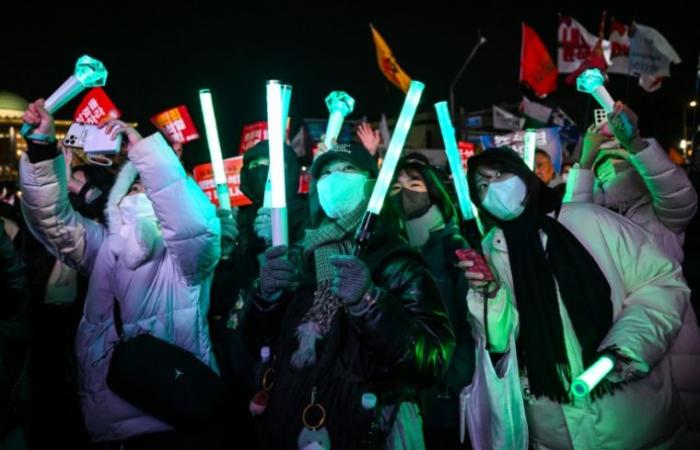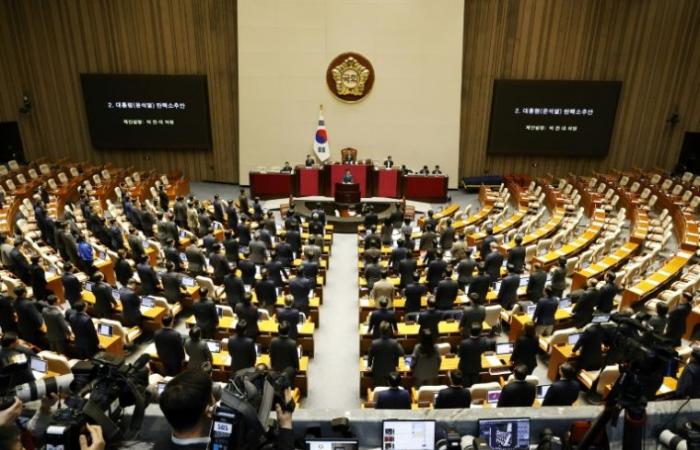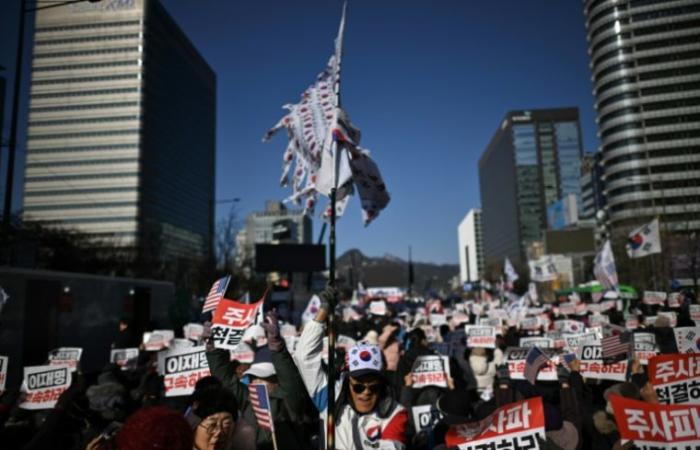Demonstration against South Korean President Yoon Suk Yeol on December 7, 2024 in front of Parliament in Seoul (AFP / ANTHONY WALLACE)
South Korean President Yoon Suk Yeol escaped impeachment on Saturday, saved by his party's deputies who boycotted a vote to this effect in Parliament, four days after his failed attempt to impose martial law and despite pressure from tens of thousands of demonstrators.
In a heated atmosphere, amid jeers and shouts, almost all the deputies from Mr. Yoon's People's Power Party (PPP), left the chamber at the time of the vote.
At least 200 votes out of 300 were needed to dismiss the unpopular conservative president, in power since 2022, but only 195 deputies ultimately participated in the vote.
“Accordingly, I declare that the vote on this issue is invalid,” said National Assembly Speaker Woo Won-shik.
“The failure to vote on this issue signifies the failure of the democratic process on a critical national issue. On behalf of the National Assembly, I apologize to the people,” Woo added.
To win, the opposition, which has 192 deputies, had to rally to its cause at least eight elected officials from the presidential party.
– “Protect the Republic” –
But only three PPP deputies voted, despite the insistence of Mr. Woo who left the ballot open until late in the evening, begging the presidential party deputies to return to cast their ballots to “protect the Republic of Korea and its democracy”.
Nearly 150,000 anti-Yoon demonstrators, according to police cited by the Yonhap news agency, surrounded the National Assembly building on Saturday evening, braving the freezing cold. The organizers claimed a million participants.
Thousands of Yoon supporters demonstrated in the center of the capital Seoul.
Protesters outside Parliament in Seoul demand the resignation of South Korean President Yoon Suk Yeol (AFP / JUNG Yeon-je)
Yoon Suk Yeol stunned South Korea on Tuesday evening by announcing the imposition of martial law — an unprecedented measure since 1980, after the coup d'état by dictator Chun Doo-hwan — and by sending the army to Parliament in order to muzzle him.
In incredible conditions, 190 deputies still managed to hold an emergency session in the night, while their assistants blocked the doors of the hemicycle with furniture to prevent armed soldiers from entering.
Unanimously, these deputies voted against martial law, forcing the head of state to repeal it after barely six hours.
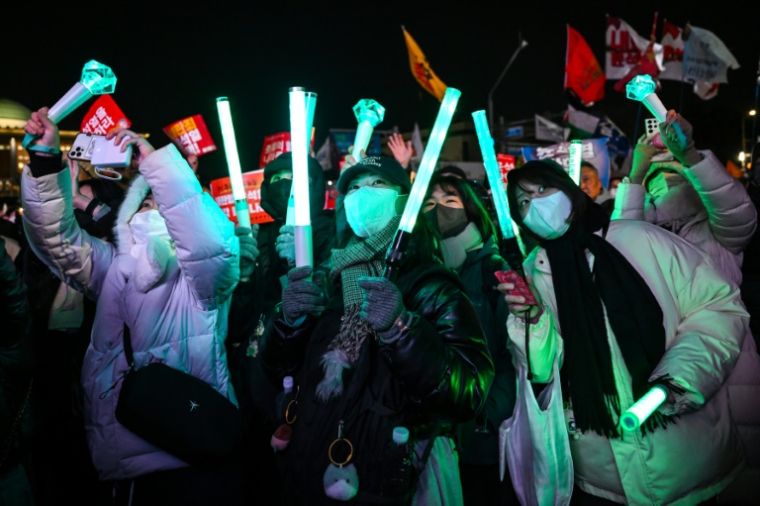
Tens of thousands of demonstrators opposed to South Korean President Yoon Suk Yeol surround Parliament in Seoul on December 7, 2024, where deputies vote for or against the dismissal of the head of state (AFP / JUNG Yeon-je)
In a televised address to the nation lasting just two minutes on Saturday morning, Mr. Yoon, 63, announced that he would entrust his party with taking “measures aimed at stabilizing the political situation, including regarding ( his) mandate”.
“I will not shy away from my legal and political responsibilities regarding the declaration of martial law,” he added.
He explained his coup by his “despair as president”, while Parliament largely dominated by the opposition torpedoed practically all his initiatives.
“I have caused anxiety and inconvenience to the public. I sincerely apologize,” he concluded before bowing deeply to viewers.
– General animosity –
His very brief speech did nothing to calm the general animosity.
The head of the PPP, Han Dong-hoon, affirmed that “an early resignation of the president is inevitable”, the normal exercise of his functions being according to him “impossible under these circumstances”.
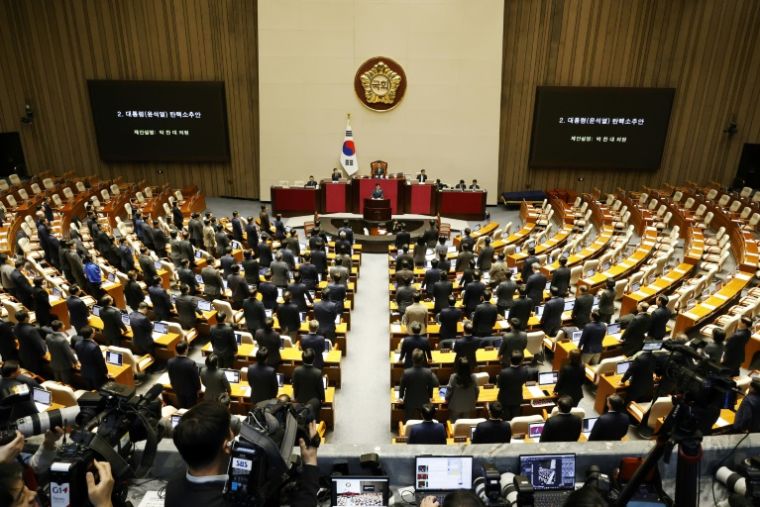
South Korean MPs consider the motion to impeach the president, December 7, 2024 in Seoul (POOL / JEON HEON-KYUN)
But at the end of a meeting on the night of Friday to Saturday, a majority of party deputies reaffirmed the official line according to which they would defeat the impeachment, while Mr. Han had called for the “rapid suspension” of Mr. Yoon.
“It seems that the ruling party has decided to oppose the impeachment in the vote on the condition that the president cedes control to it,” Chae Jin-won, a researcher at the university's Humanitas College, told AFP Kyung Hee.
“The main problem is that, while recognizing that the president has committed wrongdoing and is a criminal, they simply do not want to give power to Lee Jae-myung,” the leader of the Democratic Party, the main force opposition, added Mr. Chae.
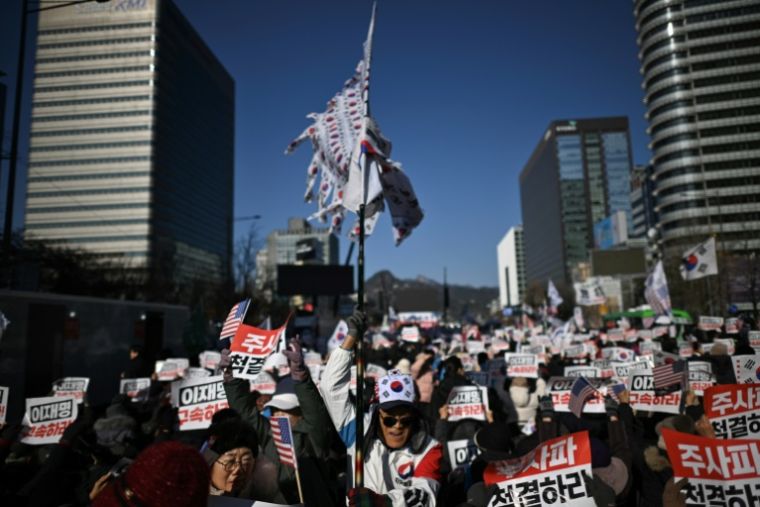
Supporters of South Korean President Yoon Suk Yeol demonstrate in central Seoul on December 7, 2024 (AFP / Philip FONG)
In front of the Assembly, tens of thousands of anti-Yoon demonstrators followed the vote with anxiety on giant screens, brandishing signs demanding the dismissal of the president and singing pro-democracy chants.
“It’s terrible to come to this today,” exclaimed An Jun-cheol, 24. “What the ruling party MPs did today, withdrawing from the vote, is nothing other than an attempt to establish their power and privileges, without caring about the people.”
A pro-Yoon rally was also held in the central square of Gwanghwamun. Demonstrators held posters reading “Arrest Lee Jae-myung”, others waved American flags.
In addition to the impeachment procedure now invalidated, Yoon Suk Yeol is the target of a police investigation for “rebellion”, a crime theoretically punishable by the death penalty, which has not been applied in the country since 1997.

